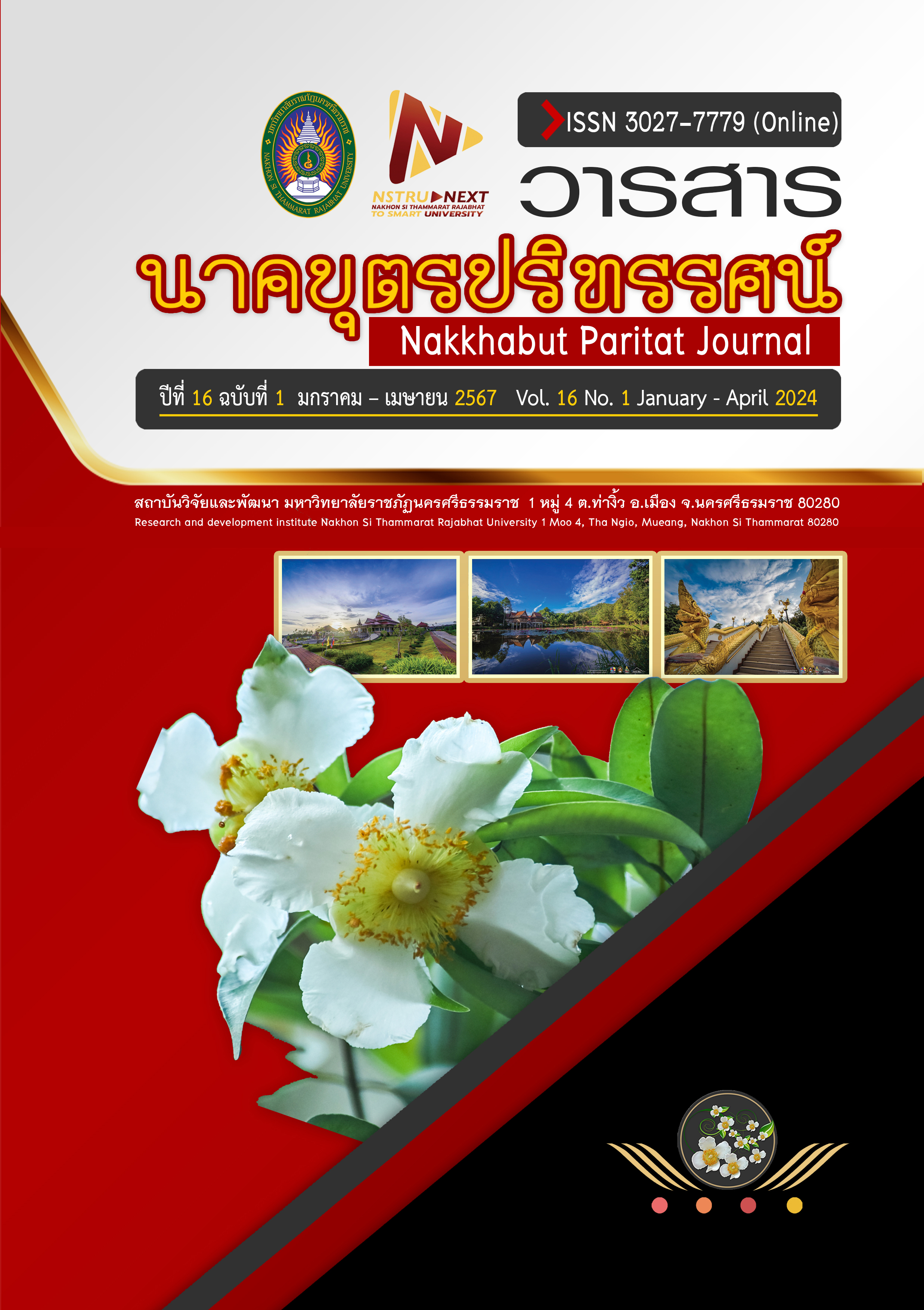An Exploration of Strategies for Autonomous Learning in Teaching English as a Foreign Language (EFL)
Main Article Content
บทคัดย่อ
Lifelong learning and its successful implementation are fundamentally tied to the principle of learner autonomy. This qualitative case study examined the varied pedagogical strategies implemented by three EFL (English as a Foreign Language) educators at a public university in Southern Thailand by using an individual semi-structured interview and thematic analysis as research tools. These strategies were aimed at bolstering students’ autonomy in English learning, centered around four key themes: Fostering Interest, Reflective Practices, Facilitating, and Encouraging Autonomous Behaviors. The study reveals that lecturers function as motivators, reflective practitioners, facilitators, and consultants, thus crafting an atmosphere conducive to autonomous learning. Traditional authoritative roles are absent, enhancing students' independent learning journey. The knowledge obtained from this research added to a repertoire of effective strategies for EFL educators and was intended to foster environmental support of autonomous learning.
Article Details

อนุญาตภายใต้เงื่อนไข Creative Commons Attribution-NonCommercial-NoDerivatives 4.0 International License.
เอกสารอ้างอิง
Benson, P., & Lor, W. (1998). Making sense of autonomous language learning: Conceptions of learning and readiness for autonomy (English Centre Monograph, No. 2). Hong Kong: University of Hong Kong, English Centre.
Borg, S., & Al-Busaidi, S. (2012). Learner autonomy: English language teachers’ beliefs and practices. British Council, ELT Research Papers, 12(07).
Braun, V., & Clarke, V. (2006). Using thematic analysis in psychology. Qualitative Research in Psychology, 3(2), 77-101.
Bui, T. (2019). English language education policy in Vietnam. Springer.
Creswell, J. W. (2013). Qualitative inquiry and research design: Choosing among the five approaches (3rd ed.). Thousand Oaks: SAGE Publications.
Darasawang, P. (2007). English language teaching and education in Thailand: A decade of change, English language teaching in East Asia today. Bangkok: ET Publishing. (in Thai)
Duong, T. M., & Seepho, S. (2014). Promoting learner autonomy: A qualitative study on EFL teachers’ perceptions and their teaching practices. Proceedings of the International Conference: DRAL2/ILA. Retrieved 2020, January 22, from https://www.researchgate.net/publication/317958482_PROMOTING_LE. 129-137.
Education Council Secretariat. (2019). National education standards 2018. Retrieved 2020, January 2, from https://www.onec.go.th (in Thai)
Freeman, S., Eddy, S. L., McDonough, M., Smith, M. K., Okoroafor, N., Jordt, H., & Wenderoth, M. P. (2014). Active learning increases student performance in science, engineering, and mathematics. Proceedings of the National Academy of Sciences, 111(23), 8410-8415.
Grow, G. (1991). Teaching learners to be self-directed. Adult education quarterly, 41(3), 125-149.
Holec, H. (1981). Autonomy in foreign language learning. Oxford: Pergamon.
Intraboonsom, C., Darasawang, P., & Reinders, H. (2020). Teacher’s practices in fostering learner autonomy in a Thai university context. Journal of language teaching and research, 11(2), 194-203.
Keller, J. M. (2016). Motivation, learning, and technology: Applying the ARCS-V motivation model. Participatory Educational Research, 3(2), 1-13.
Lamb, M. (2015). The role of English teaching in modern Japan: Diversity and multiculturalism through English language education in a globalized era. International Journal of Research Studies in Language Learning, 4(2), 91-101.
Lawrence, M. J. (2015). Purposive sampling. Research methods foundations. UK: SAGE Publications.
Mercer, S., & Dörnyei, Z. (2020). Engaging language learners in contemporary classrooms. Cambridge: University Press.
Nguyen, T. T. M., & Walkinshaw, I. (2016). A comparative study of first and second language teachers: Conceptions and approaches to teaching in a Vietnamese university. Australian Journal of Teacher Education, 41(10), 2-13.
Nunan, D. (1997). Designing and adapting materials to encourage learner autonomy. In P. Benson & P. Voller (Eds.), Autonomy and independence in language learning. Longman.
Phongsakonkun, W., & Yutdhana, S. (2018). Development and implementation of a learner autonomy promotion program in an EFL classroom. Journal of language teaching and research, 9(1), 188-197.
Rubin, H. J., & Rubin, I. S. (2012). Qualitative interviewing: The art of hearing data. UK: SAGE Publications.
Scheb-Buenner, P. (2018). University students’ perception on autonomous learning: A Case of private university, Thailand. In ICES 2018: The 1st international conference on English studies organizing committee.
Shuttleworth, M. (2012). Case study research design. Retrieved 2020, April 2, from https://explorable.com/case-study-research-design
Suraratdecha, S., & Tayjasanant, C. (2020). Thai teachers’ self-assessment and student perceptions on the practice of autonomy. Kasetsart journal of social science, 41(1), 46-52 (in Thai)
Suwanarak, K. (2015). Learning English as Thai adult learners: an insight into experience in using learning strategies. English language teaching; 8(12),144-157
Yin, R. K. (2009). Case study research: Design and methods (4th ed.). CA: Sage.
Yurdakul, C. (2017). An Investigation of the relationship between autonomous learning and lifelong learning, International journal of educational research review, 2(1), 15-20.


